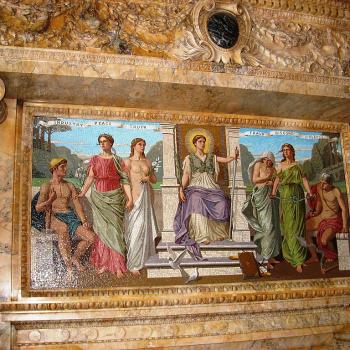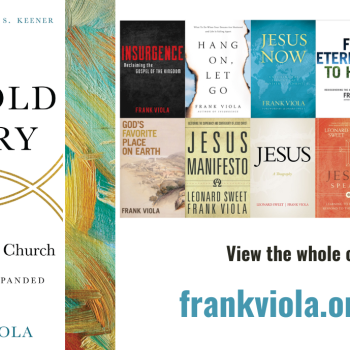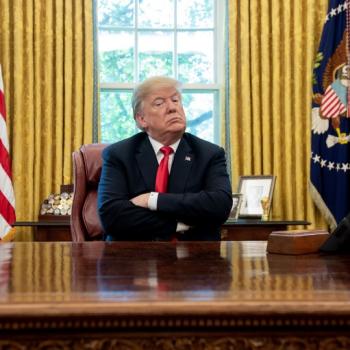Editors' Note: This article is part of the Patheos Public Square on the Future of Faith in America: Evangelicalism. Read other perspectives here.
When it comes to thinking about the future of Evangelicalism in the U.S., the major problem for the pundit is one of definition. Evangelicalism is a nebulous term whose definition is highly contested. For the sake of argument, I here take it to refer to that loose collection of churches, institutions, and parachurch organizations that identify in some sense with the Protestantism originating in the 18th-century revivals and thus as related to, but distinguishable from, higher church forms of Protestantism such as Anglicanism, Lutheranism, and confessional Presbyterianism.
The question of the legitimacy of homosexuality is set to break the movement's institutions and alliances apart in a way not seen since the bloody battles over feminism. This division will likely be even more profound, as the issue is one that strikes much deeper at the notions of personhood, sexuality, and morality than the complementarian/egalitarian debate. It is true that we currently witness some wrestling over the definition of homosexuality and what is and is not deemed legitimate. I anticipate, however, that the shifts on this issue in the wider world, legal and generational, will polarize the discussion and rapidly eliminate the middle ground of agnostic or compromise positions. Ours is not an age of subtle distinctions in matters of cultural policy. Churches, institutions, and individuals will be forced to stand clearly on one side or the other. And that will be very hard for those evangelicals who have thought their scholarship or their urbanity or, more recently, their urban chic buys them a lasting place at the cultural table. The wider world is coming to regard the issue of homosexuality, like the issue of race, as an absolute test of social acceptability.
Conservative Evangelicalism may be more robust in terms of recruitment than other Christian alternatives at this point but it looks singularly ill-equipped to face the challenges of the coming days. It simply lacks the identity and the resources that come with historic rootedness, a point which makes it perennially vulnerable to becoming simply American culture in a Christian idiom. In comparison to Evangelicalism, Roman Catholicism, for example, has a clear ecclesiastical identity and a long tradition of social teaching, both of which have helped to foster serious intellectual engagement on many of the ethical issues of the present day.
Conservative Evangelicalism, by contrast, seems to have invested more time and money over the last decade in building up a celebrity culture and publishing a disproportionate amount of fluff. It has created a self-perpetuating industrial complex of coalitions, publishers, and conferences overseen by a cadre of self-appointed and often autocratic leaders. Thus, if you want an engaging preacher or a flashy conference, you turn to the evangelicals. If you want to know how to think, for example, about marriage, euthanasia, fertility treatment, issues of church and state — matters which are part of a pastor's daily diet and which are becoming more, not less, complicated — then really you have to look elsewhere for the best Christian material. None of this bodes well for the long-term institutional or theological stability of the movement.
At the congregational level, economic realities are likely to transform the nature of ministry. Declining church revenues and the escalating cost of health care and benefits will make it increasingly difficult for churches of, say, 200 people or fewer, to pay a living a wage to a pastor. This is not a specifically evangelical issue and, in fact, is already well underway in mainline Protestantism. As a result, either more people will tend to join megachurches or more pastors will become bi-vocational. This could actually be a good thing, helping to raise the profile of the ruling eldership and encouraging more day-to-day involvement in the church by congregations. It will also require that seminaries re-think the model used for training pastors, as the current one is predicated on unrealistic expectations concerning the investment of time and money by students for the ministry.
To close on a positive note, I do think these straitened times will see growth in the best kind of ecumenism. Not that which involves churches and institutions setting aside that which makes them distinctive in the quest for blandness, but that which informally connects individuals from different traditions in bonds of friendship, fellowship, and co-belligerence as the cultural ethos turns against all forms of traditional Christianity. Most Christians see themselves as people connected to a local church and the fate of a wider evangelical movement is not something that keeps them awake at night. It is there, at the local level, that real differences can be made and real ecumenical connections can be forged. That is something which I am personally already enjoying and which is an unexpected benefit of living in an age of otherwise depressing setbacks.
7/22/2015 4:00:00 AM




